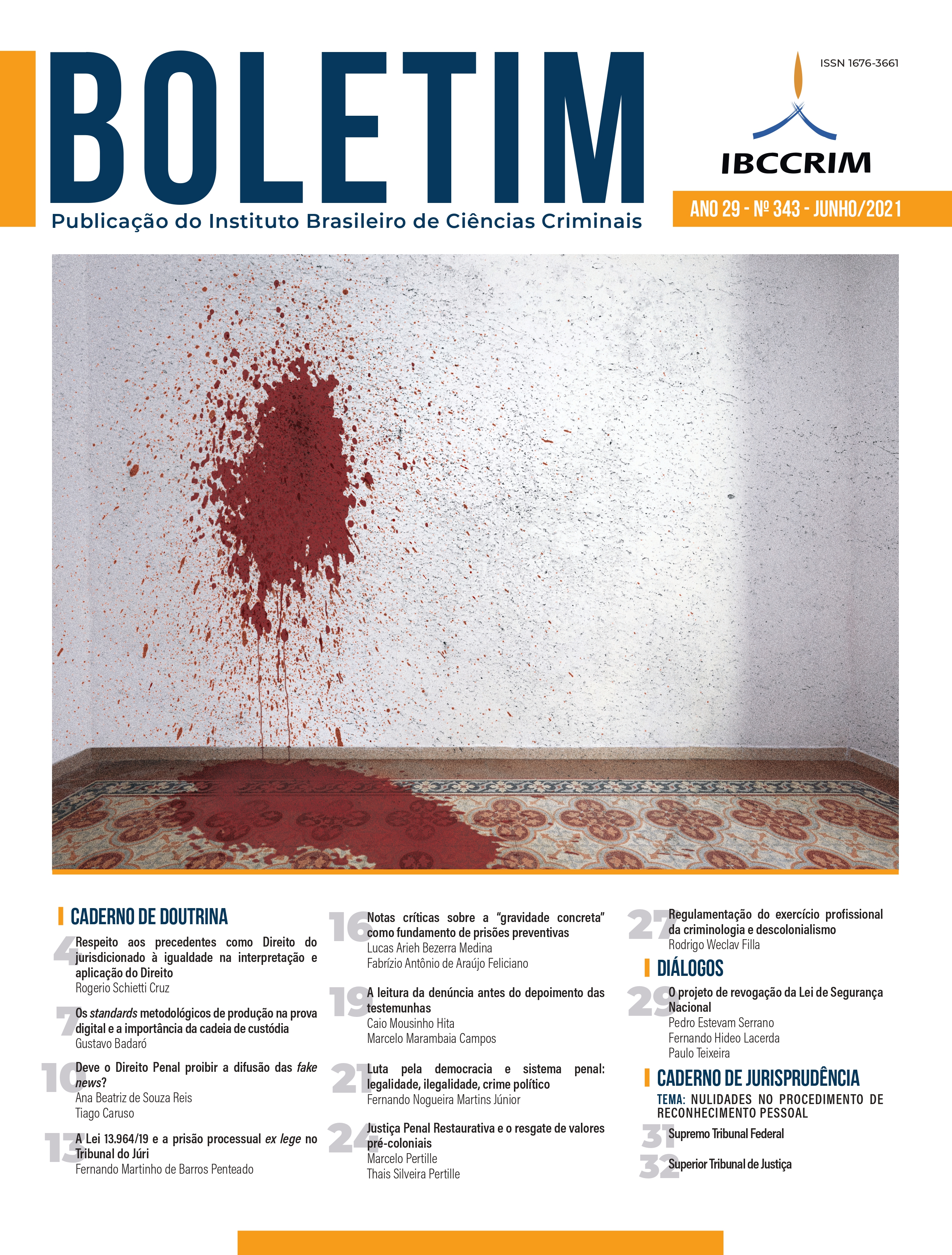The methodological standards on the production of digital evidence production and the importance of the chain of custody
Views: 972Keywords:
Digital Evidence, Chain of Custody, Computer ForensicsAbstract
This article analyzes digital evidence and the problems arising from its differences with traditional evidence. Due to the non-material character and the “congenital mutability” of digital evidence, it is argued that its epistemic validity depends on the compliance with specifics methodological standards of computer forensics, which are required to individualize the computer system that stored the digital data useful to the investigation, its collection, conservation, analysis and results presentation in Court, through digital evidence expert opinion, as well as the complete chain of custody documentation.
Downloads
Publication Facts
Reviewer profiles N/A
Author statements
- Academic society
- Instituto Brasileiro de Ciências Criminais
- Publisher
- IBCCRIM
References
CARIA, Giovanni. Le quattro fasi dell’analise forense: identificazione, acquisizione, analisi, reporting. In: IASELLI, Michele (Org.) Invesytigazione ditigali. Milano: Giuffrè Francies Lefebvre, 2020, p. 3
CASEY, E. Digital evidence and computer crime. 3. ed., London: Elsevier, 2011, p. 60.
DANIELE, Marcello. La prova digitale nel processo penale. Rivista di Diritto Processuale, v. 66, n. 2, p. 283-298, 2011, p. 283.
KENT, Karen; CHEVALIER, Suzanne; GRANCE, Tim; DANG, Hug. Guide to Integrating Forensic Techniques into Incident Response. Recommendations of the National Institute of Standards and Technology. Gaithersburg: NIST, 2006. Disponível em: https://nvlpubs.nist.gov/nistpubs/Legacy/SP/nistspecialpublication800-86.pdf. Acesso em: 12 mai. 2021.
KERR, O.S. Digital evidence and the new criminal procedure. Columbia law review, v. 105, p. 279-318, 2005, p. 284.
LORENZETTO, Elisa. Le attività urgente di investigazione informatica e telematica, In: LUPÁRIO, Luca (Coord.). Sistema penale e criminalità informatica. Profili sostanziali e processuali nella Legge attuativa della Convenzione di Budapest sul cybercrime. Milano: Giuffrè, 2009.
LUPÁRIO, Luca. Processo penale e scienza informatica: anatomia de una trasformazione epocale, In. Luca Lupária; Giovanni Ziccardi, Investigazione penale e tecnologia informatica. L’accertamento del reato tra progresso scientifico e garanzie fondamentale, Milano: Giuffrè, 2007.
PITTIRUTI, Marco. Digital evidence e procedimento penale. Torino: Giappichelli, 2017.
VACIAGO, Giuseppe. Digital Evidence. I mezzi di ricerca della prova digitale nel procedimento penale e le garanzie dell’indagato. Torino: Giappichelli, 2012.
ZICARDI, Giovanni. Le linee guida della Association of Chief Police Officers Inglese, In: LUPÁRIO,
Luca; ZICCARDI, Giovanni. Investigazione penale e tecnologia informatica. L’accertamento del reato tra progresso scientifico e garanzie fondamentale, Milano: Giuffrè, 2007.
Downloads
Published
How to Cite
Issue
Section
License
Copyright of published articles belongs to the author, but with journal rights over the first publication and respecting the one-year exclusivity period. Authors may only use the same results in other publications by clearly indicating this journal as the medium of the original publication. If there is no such indication, it will be considered a situation of self-plagiarism.
Therefore, the reproduction, total or partial, of the articles published here is subject to the express mention of the origin of its publication in this journal, citing the volume and number of this publication. For legal purposes, the source of the original publication must be consigned, in addition to the DOI link for cross-reference (if any).


 Português (Brasil)
Português (Brasil)
 English
English
 Español (España)
Español (España)










